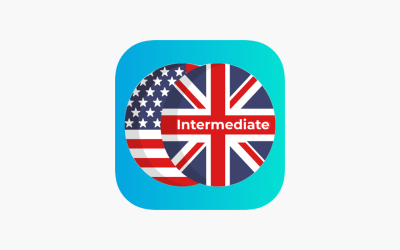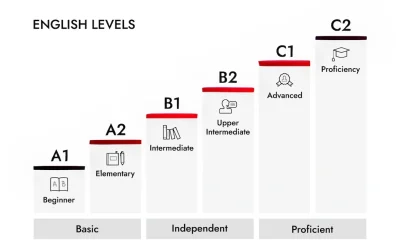Improving your English level from B1 (Intermediate) to B2 (Upper-Intermediate) is a significant step in mastering the language. At B1, you can handle everyday situations and express yourself on familiar topics. Moving to B2 involves developing fluency, understanding complex topics, and communicating with more precision and confidence. Here’s a step-by-step guide to help you achieve this goal.
What’s the Difference Between B1 and B2?
B1 (Intermediate):
- You can understand the main points in conversations on familiar topics.
- You can manage routine situations, such as travel or shopping.
- You can describe experiences and express opinions on simple topics.
B2 (Upper-Intermediate):
- You can understand more complex and abstract ideas, including technical discussions in your field.
- You can interact fluently with native speakers without strain.
- You can express yourself clearly on a wide range of topics, providing explanations and arguments.
Tips to Improve from B1 to B2
1. Expand Your Vocabulary
At B2, you’ll need a broader vocabulary to discuss abstract concepts and specific topics like technology, politics, or business.
- How to do it:
- Use vocabulary apps like Quizlet or Anki to learn new words.
- Read articles, blogs, or books on varied topics. Highlight and review unfamiliar words.
- Focus on collocations (words that naturally go together, e.g., “make a decision” or “take responsibility”).
2. Practice Listening to Advanced Content
B2 requires understanding fast and detailed speech in conversations, lectures, or media.
- How to do it:
- Watch English TV shows, documentaries, or podcasts at natural speed.
- Use subtitles initially, then gradually remove them.
- Practice listening to different accents to improve comprehension.
3. Develop Writing Skills
At B2, your writing should be more structured, coherent, and detailed.
- How to do it:
- Write essays, emails, or journal entries on diverse topics.
- Focus on using linking words (e.g., however, therefore, meanwhile) to create logical connections.
- Use online tools like Grammarly or LanguageTool to identify and correct errors.
4. Improve Speaking Fluency
Fluency at B2 means speaking comfortably about both familiar and complex topics.
- How to do it:
- Practice speaking with language partners or tutors. Platforms like Italki or Tandem are great for this.
- Use shadowing techniques: listen to a native speaker and repeat immediately, mimicking their intonation and rhythm.
- Record yourself answering common interview questions or discussing current events.
5. Master Grammar at a Deeper Level
You’ll need a strong grasp of grammar to express yourself with accuracy and clarity.
- Key grammar points to focus on:
- Passive voice (e.g., The book was written by a famous author.)
- Conditional sentences (e.g., If I had more time, I would learn another language.)
- Modal verbs for speculation (e.g., He must be tired after the long trip.)
- How to do it:
- Use grammar books like English Grammar in Use by Raymond Murphy.
- Take practice exercises on websites like Perfect English Grammar or BBC Learning English.
6. Engage with Authentic Reading Materials
At B2, you should be able to understand and interpret authentic texts like news articles, blogs, or fiction.
- How to do it:
- Read online newspapers (e.g., BBC, The Guardian) and focus on understanding the main ideas.
- Choose books or short stories suited to your level, gradually moving to more challenging material.
- Summarize what you read in your own words to reinforce understanding.
7. Take Practice Tests
Testing your skills regularly will help you measure progress and identify areas to improve.
- How to do it:
- Take mock tests for International English Test (IET) or other standardized exams like IELTS or TOEFL.
- Analyze your performance: focus on weak areas like listening, speaking, or grammar.
8. Immerse Yourself in English
Immersion helps you integrate English into your daily life.
- How to do it:
- Set your phone and apps to English.
- Think in English and try describing your day or making plans in the language.
- Participate in English-speaking meetups or online communities like Reddit’s r/EnglishLearning.
9. Seek Feedback
Feedback is crucial for improvement.
- How to do it:
- Work with a tutor who can correct your mistakes and guide you.
- Share your written work on forums like LangCorrect to receive constructive feedback.
Track Your Progress with the International English Test (IET)
The International English Test (IET) is an excellent tool to assess your progress. It evaluates reading, writing, speaking, and listening skills according to CEFR levels. Regularly taking the IET can help you monitor your improvement from B1 to B2, and its certification can boost your resume and career prospects.
Conclusion
Transitioning from B1 to B2 English is a rewarding challenge that requires dedication, consistent practice, and a focus on diverse language skills. By following these tips and incorporating English into your daily life, you’ll soon gain the fluency, confidence, and competence needed for upper-intermediate proficiency.
Start your journey today and let the International English Test guide your progress!
I am Nilay, an experienced English Language Assessment Director at the International English Test, where I have been working full-time since February 2020. I specialize in helping people worldwide validate their English proficiency through comprehensive assessments and certifications.
Before joining the International English Test, I worked as a self-employed English Language Assessment Consultant from January 2015 to December 2019. During this time, I assisted companies and individuals in improving their language skills, helping them achieve their academic and professional goals.
I hold a degree in Engineering and have also studied at Shafston International College in Australia. My educational background has equipped me with the tools to make a meaningful impact in the field of English language learning. Additionally, I enjoy sharing my expertise through articles that explore effective teaching methods and language assessment strategies, contributing to the International English Test and the broader assessment community.




